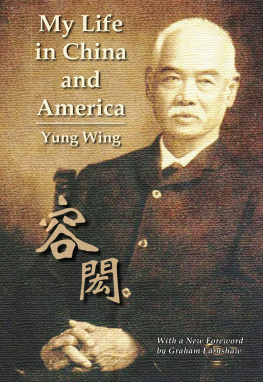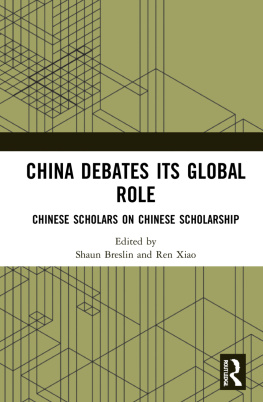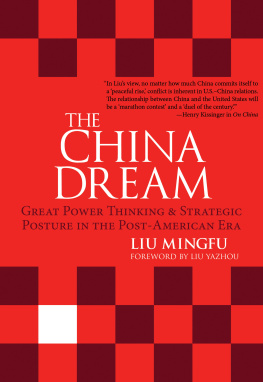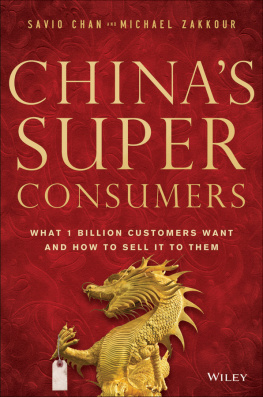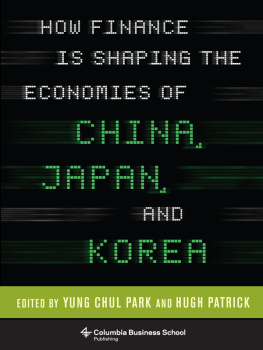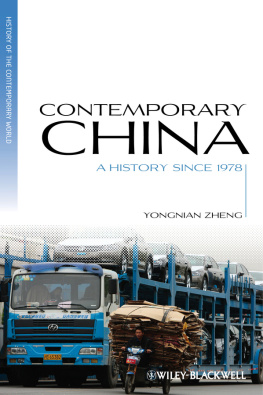My Life in China and America
By Yung Wing
With a New Foreword by Graham Earnshaw
ISBN-13: 978-988-99874-5-9
2007 Earnshaw Books
My Life in China and America was first published in November, 1909.
HISTORY / Asia / China
First printing September 2007
Second printing November 2008
Third printing August 2009
Fourth printing June 2015
EB010
All rights reserved. No part of this book may be reproduced in material form, by any means, whether graphic, electronic, mechanical or other, including photocopying or information storage, in whole or in part. May not be used to prepare other publications without written permission from the publisher except in the case of brief quotations embodied in critical articles or reviews. For information contact
Published by Earnshaw Books Ltd. (Hong Kong)
Foreword
by Graham Earnshaw
T HIS book from another era is a gem because it is written by a man who crossed so many boundaries. It is a glimpse into the world of China in the mid and late 19th century, at the crucial moment when this ancient and closed civilization was being forced to accept the existence of the West and its superiority in science, trade and military technology.
My Life in China and America was written by Yung Wing, who was born in a village in southern China in the year 1828 and became one of the first Chinese people ever to be educated at a major US college, graduating from Yale in 1854. As such, he was one of the first Chinese to cross the cultural gulf and learn about the West. But luckily for us, he did not leave his past behind and just fade into the fabric of American life as most Chinese emigrants to the United States did. Instead, he returned to his own world, seeing it now through outsiders eyes. And then towards the end of his life in the early 1900s, he wrote out his life story the book you are now reading. It was published in 1909, and he died in 1912.
Yung Wing balanced off the two worlds referred to in the title China and America in unique ways. He went to Washington in 1864 and volunteered to join the Union army to help defeat the Confederacy, and also visited the Taiping rebel capital of Nanjing and gave active consideration to helping them in their struggle to overthrow the Manchu government. He was a part of the missionary Christian community of the United States and also bought and built an armaments factory for the Manchus in China. He was a great believer in the strengths and benefits of Western civilization and was also fiercely patriotic and proud of being Chinese.
He neatly bridged two eras. When he was born, China was still essentially the willow pattern world largely unsullied, or at least untouched, by the West. He moved from a south China paddy field to a missionary school in Macao, and could already speak and read English by the time the first Opium War got under way in 1841. One of the results of that conflict was the establishment of the British colony of Hong Kong, and Yung Wing passed through there on his way to the United States and initiation into an entirely different culture. By the time he died, the West was crawling all over China and the Chinese state was lying prostrate, the victim of the incompetent, corrupt and terminally ineffective Manchu government.
Yung Wings outside perspective on China and its problems had huge value in those days as the country and its officials stumbled around blindly incapable of dealing with the overwhelming power and presence of the West, and he tried in many ways over the years to inject what he had learned into the enfolding tragedy of 19th century China. Mostly to no avail: he was way ahead of his time in so many ways. But what is interesting is that many of his ideas were taken up by others and became key building blocks on which the future of China was to be built. Education reform, banking reform and armaments manufacture were just three of his conceptual or concrete contributions, but there were many more. He did not live to see the fall of the Manchu government in 1911 and the flailing around that characterized the early years of Republican China. But he represented, indeed created, many of the trends of thought that marked the efforts by the post-imperial leaders of China to find a new path for their country. Fundamentally, the Republican movement believed that Chinas best bet was to learn from the West, and to integrate Western concepts of politics, society and economics into Chinas structure to help it find a way out of the morass of the past. Precisely the view that Yung Wing had advanced decades earlier. In the event, of course, the Western-oriented middle class China of which Yung Wing was a forerunner, fell victim to the upheavals of the 20th century, ending with the victory of the peasant Marxist Mao Zedong in 1949.
But Mao benefited from Yung Wings activities too. China Merchants, which Yung Wing first conceived of, was the foundation of communist Chinas merchant fleet, and the armory which Yung Wing built morphed over the decades to become communist Chinas largest shipyard.
I like Yung Wing. He entirely lacks the arrogance that infected both Westerners and Chinese officials in that era. He is not a professional writer, and so his story is told in a simple way which eschews the florid Victorian style that puts so many books published during those years into categories ranging from quaint to unreadable. Yung Wings story overall reads like it could have been written decades after it was.
I hesitate to include too much more detail on the book because Yung Wing deserves the right to tell his own story in his own way. But he was a Chinese witness with a Western perspective on the events that wracked China through the 19th century, and I personally have never heard of any other Chinese who watched these developments, and even participated in them, and left a record of it in English.
He experienced the appalling racism of Westerners, and the bloodthirsty cruelty of Chinese. As a young lawyer just back from the United States in the 1850s, he was pushed out of Hong Kong by mediocre English lawyers who saw his bilingual and bicultural abilities as a threat, a theme played out time and time again in the Hong Kong of the 20th century too. He was offered the chance to become a compradore for a foreign trading firm, a position that allowed men to become fabulously wealthy, but he turned it down because he couldnt abide the corruption that it involved. His fight with a Scotsman and his fearlessness when dealing with the Japanese governor of Taiwan show the mark of the man. In conversation, I imagine Yung Wing would have been quiet and unassuming, but with every word wise and telling. I think we would all have enjoyed knowing him, but at least he left us this book.
Graham Earnshaw
Shanghai
August 2007
TO
MY DEVOTED SONS
MORRISON BROWN
AND
BARTLETT GOLDEN YUNG
THESE REMINISCENCES
ARE AFFECTIONATELY DEDICATED
CONTENTS
PREFACE
The first five chapters of this book give an account of my early education, previous to going to America, where it was continued, first at Monson Academy, in Monson, Massachusetts, and later, at Yale College.
The sixth chapter begins with my reentrance into the Chinese world, after an absence of eight years. Would it not be strange, if an Occidental education, continually exemplified by an Occidental civilization, had not wrought upon an Oriental such a metamorphosis in his inward nature as to make him feel and act as though he were a being coming from a different world, when he confronted one so diametrically different? This was precisely my case, and yet neither my patriotism nor the love of my fellow countrymen had been weakened. On the contrary, they had increased in strength from sympathy. Hence, the succeeding chapters of my book will be found to be devoted to the working out of my educational scheme, as an expression of my undying love for China, and as the most feasible method to my mind, of reformation and regeneration for her.
Next page
